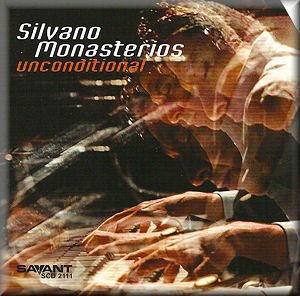1. Farmacia del Angel
2. Monsieur Petit Noir
3. A Song for Jacques Part I
4. A Song for Jacques Part II
5. Sno' Peas
6. Forgotten Gods
7. Unconditional
8. Black Saint
Silvano Monasterios - Piano, keyboards
Troy Roberts - Tenor sax, soprano sax
Jon Dadurka - Bass (tracks 1-4, 6, 8)
Gabriel Vivas - Bass (tracks 5, 7)
Rodolfo Zuniga - Drums
Jos‚ Gregorio Hern ndez - Percussion
Silvano Monasterios may not be a well-known jazzman in the UK but this is his fourth album, although it is his first for the Savant label. He was born in Venezuela, but emigrated to Miami. Seven of the eight tracks on this CD are originals by Silvano and they are permeated by the sounds and rhythms of South America, aided by drummer Rodolfo Zuniga and percussionist Jos‚ Gregorio Hern ndez.
The general mood of the CD is restrained and understated, although Forgotten Gods hots up after a quiet start, as tenorist Troy Roberts gets more and more voluble as the track progresses. Roberts and Monasterios are outstanding soloists throughout the album.
Farmacia del Angel is a tribute to Monasterios' piano-playing doctor father. Silvano's piano solo is a suitably delicate homage to his parent. Monsieur Petit Noir is another tribute: this time to Silvano's pet dog, with Troy Roberts' sax reminding us obliquely of canine sounds.
A Song for Jacques is in honour of Venezualen broadcaster Jacques Brauunstein, who widened Silvano's views of jazz. The first part is a tender elegy, with bowed bass from Jon Dadurka, while the second part is celebratory, with the saxophone swirling joyfully and Silvano exploring the whole gamut of the piano. Phil Markowitz's Sno' Peas (previously recorded by Bill Evans) is the only non-original on the album. Troy Roberts takes to the soprano sax, and gyrates cheerfully in his solo, as does Silvano.
The title-track, Unconditional, refers to unconditional love - including love for family, music and other musicians. This tender-hearted ballad expresses the idea well, with pensive solos from Roberts and particularly Monasterios. Silvano switches to electric keyboard for the final Black Saint, which has an aura of funky fusion.
This is an engaging album which avoids overstatement. The music is brightly played and brightly recorded. The only problem I have with it is that, because it consists mainly of original compositions, it is hard to get a grip on the shape and structure of the melodies and harmonies. Yet it repays repeated listening, which means it is worth buying so that you can get more deeply into it.
Tony Augarde
www.augardebooks.co.uk
